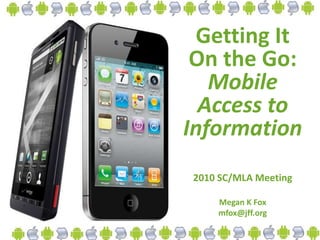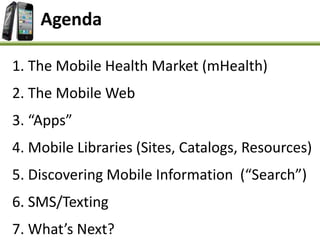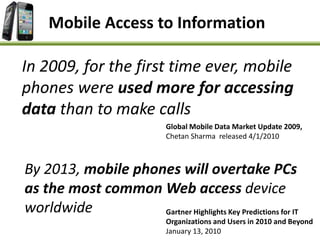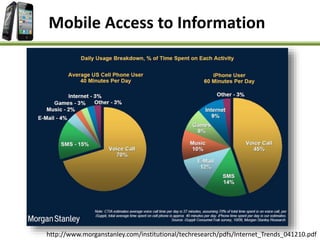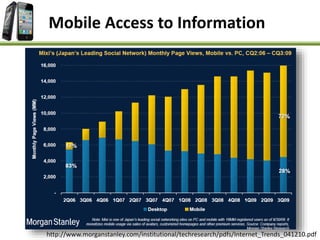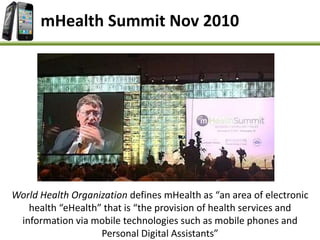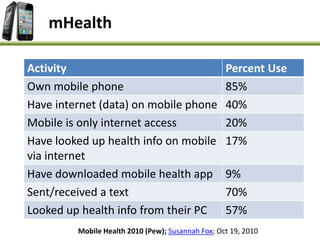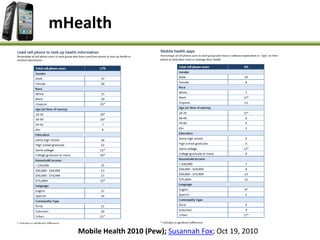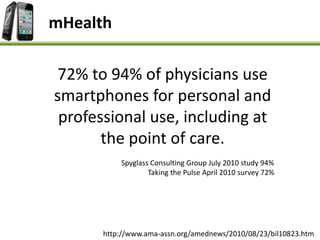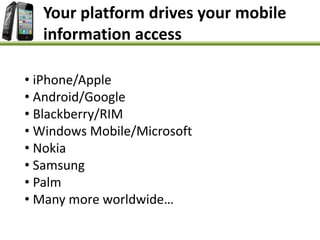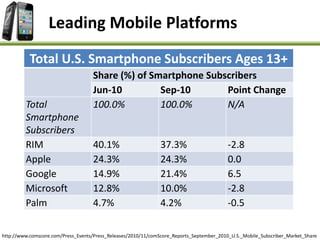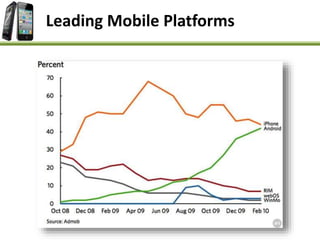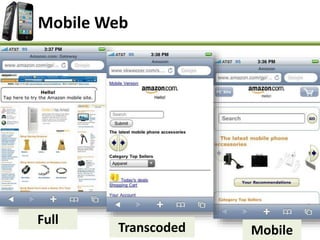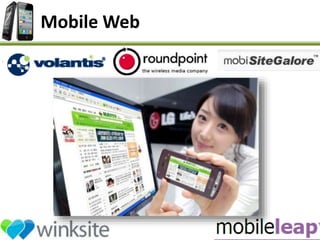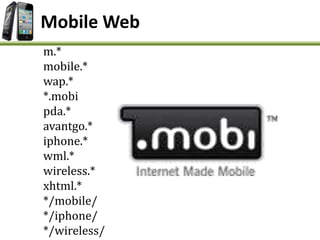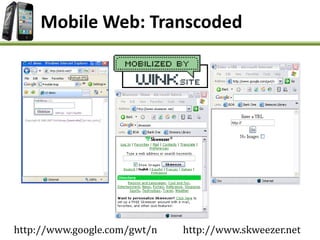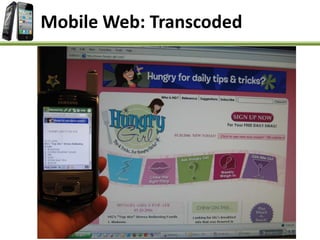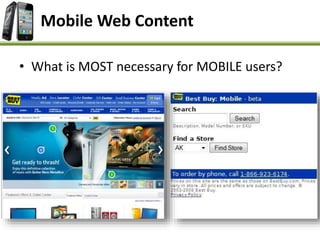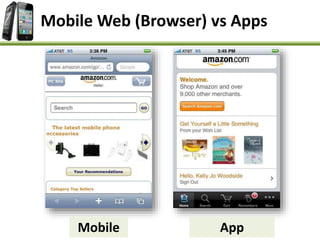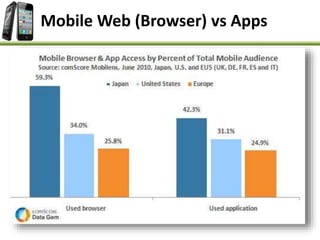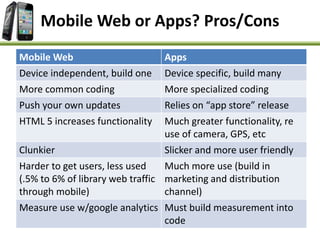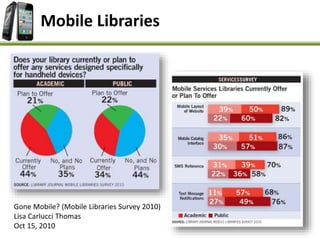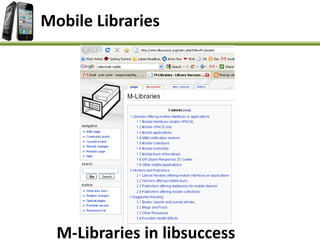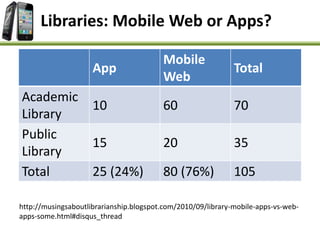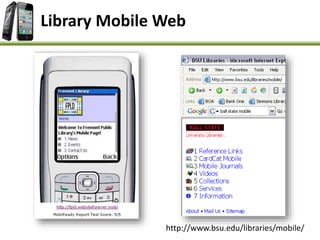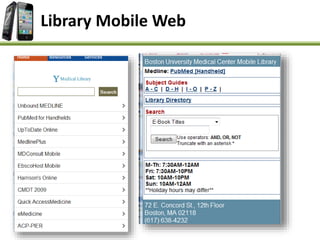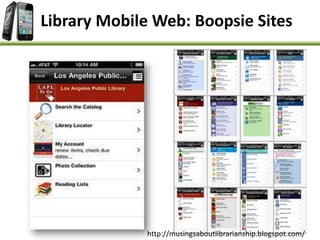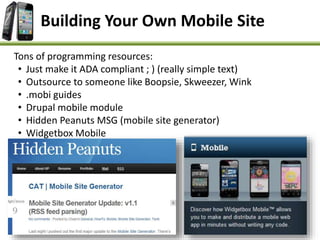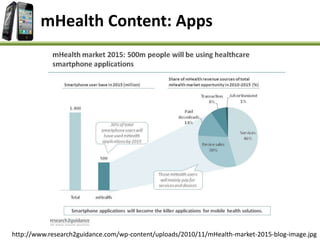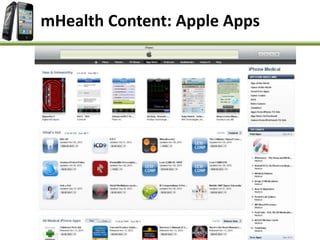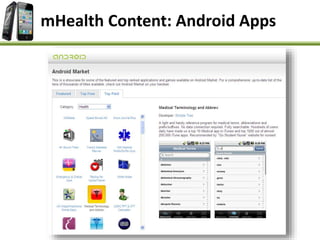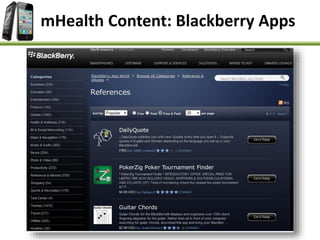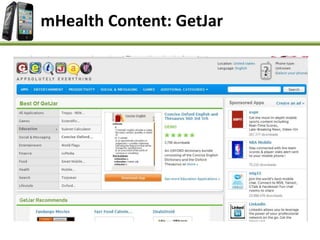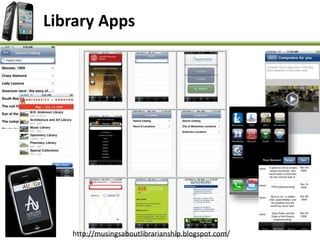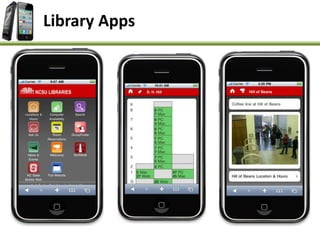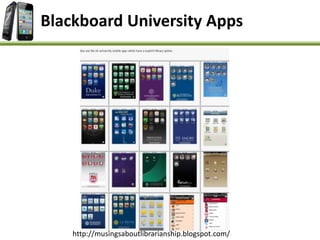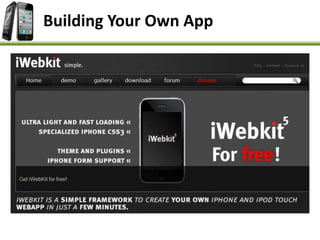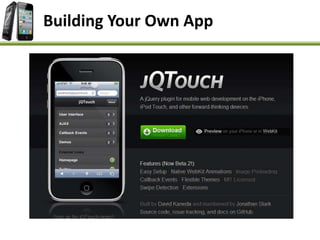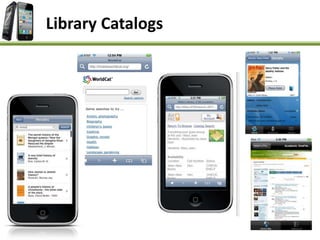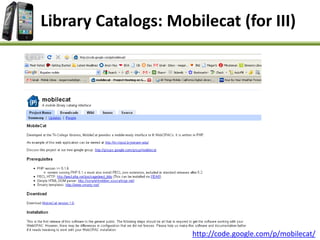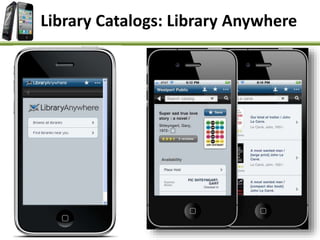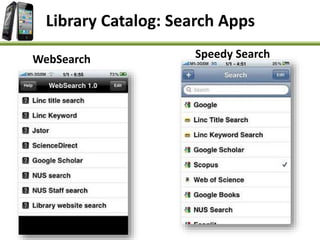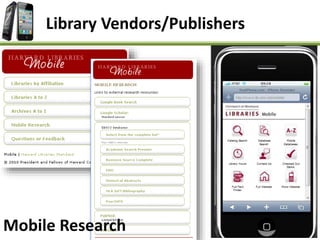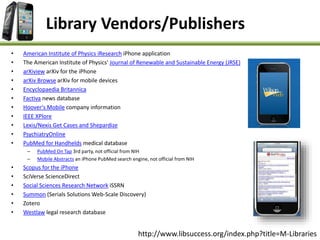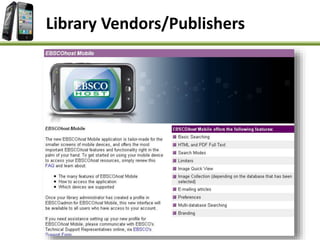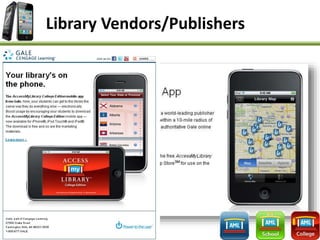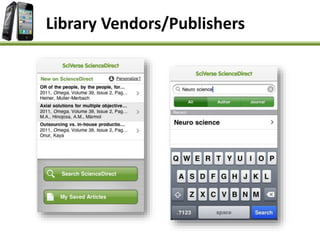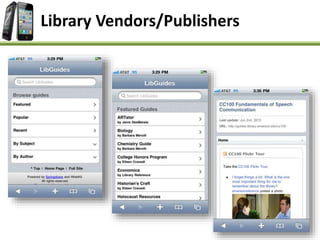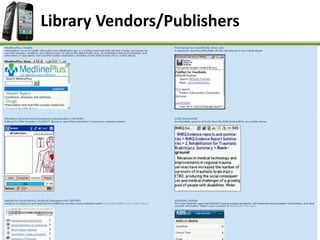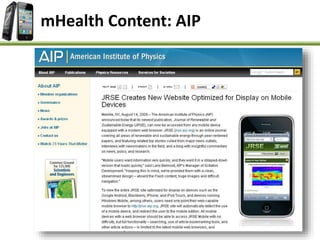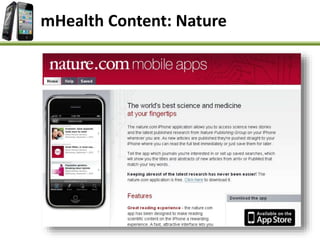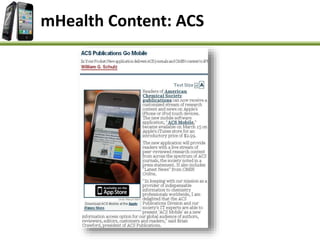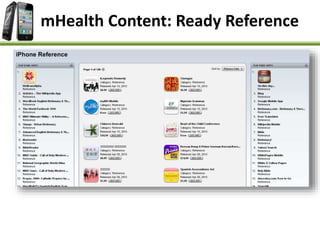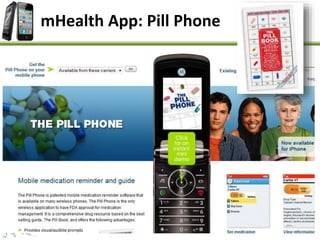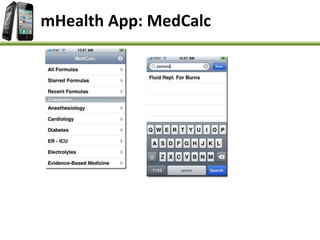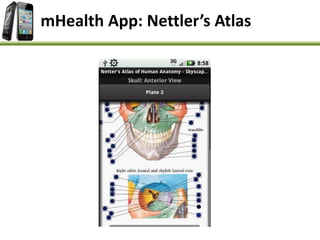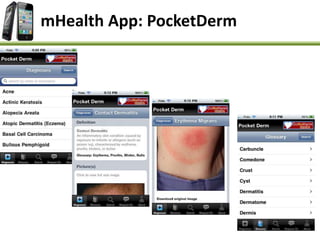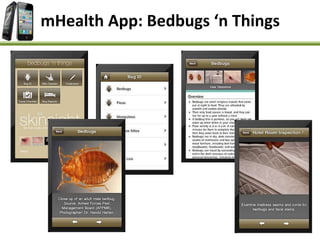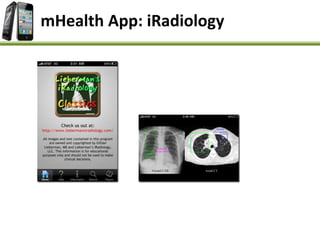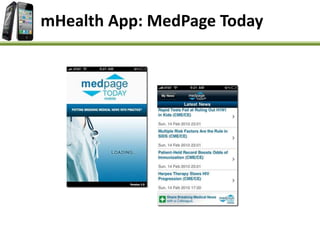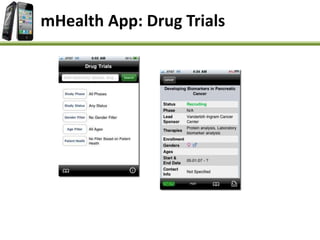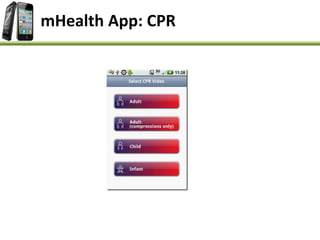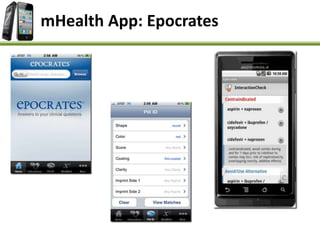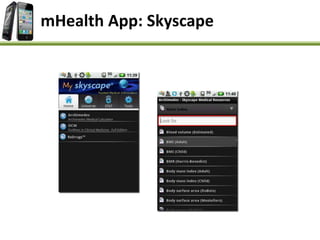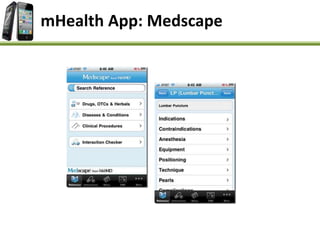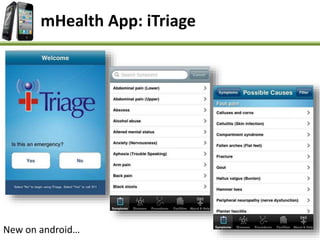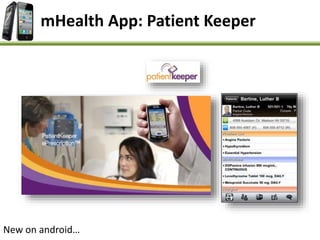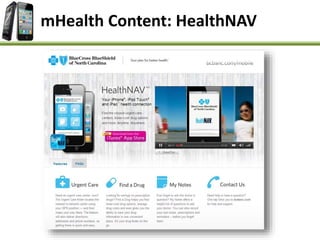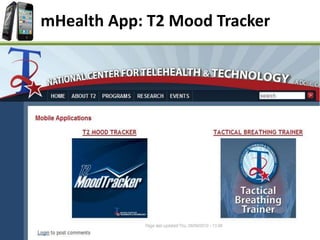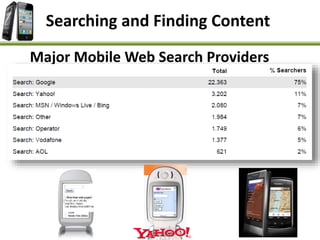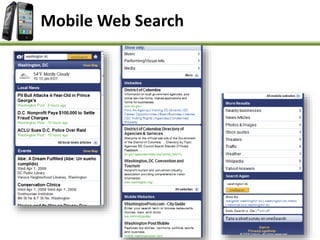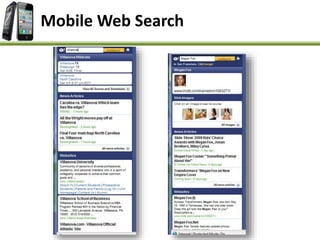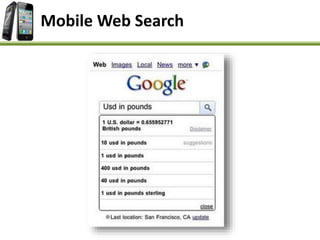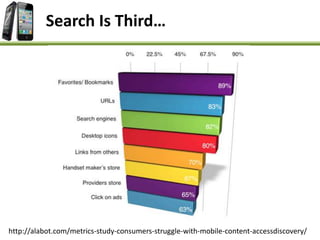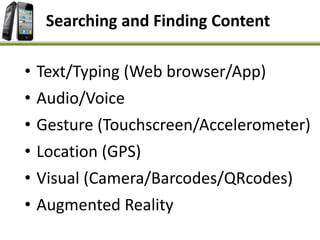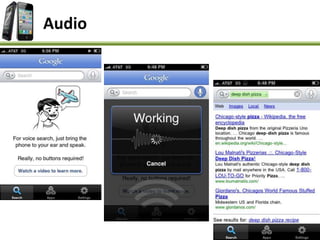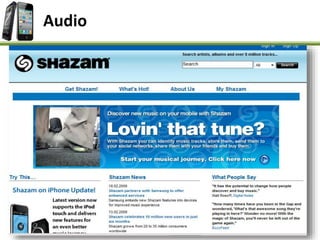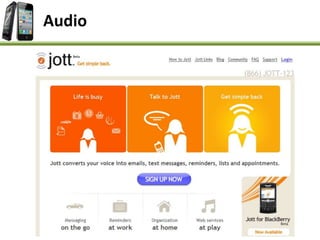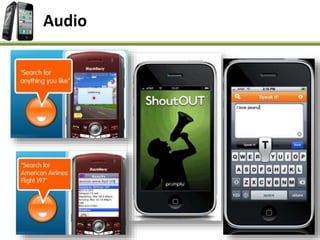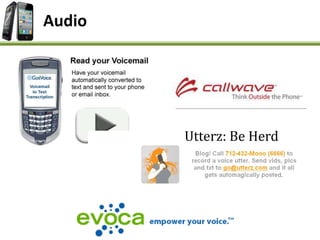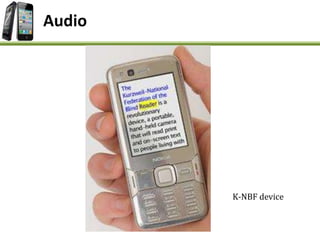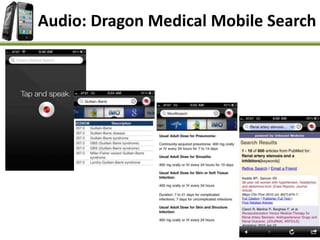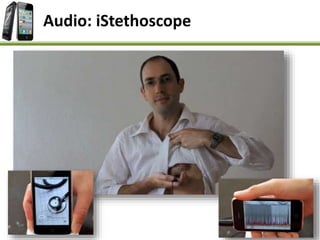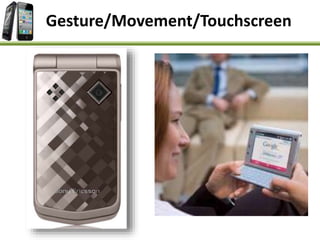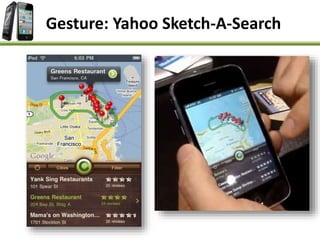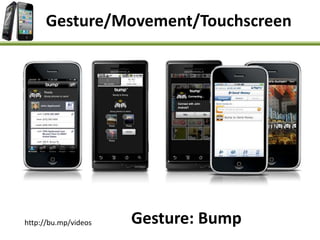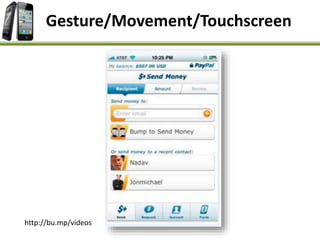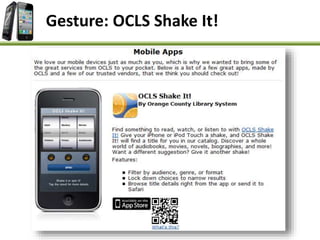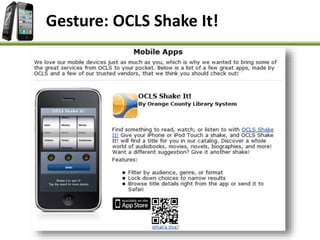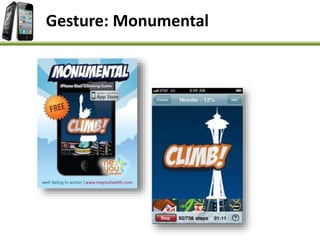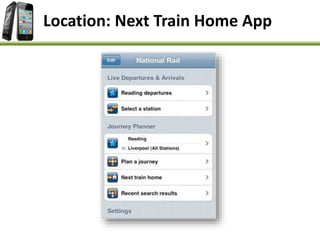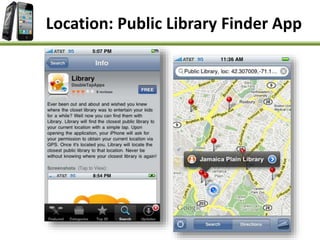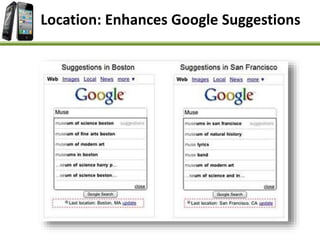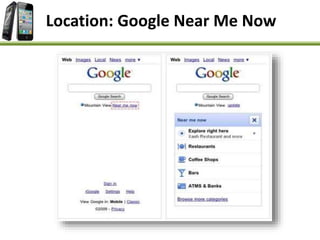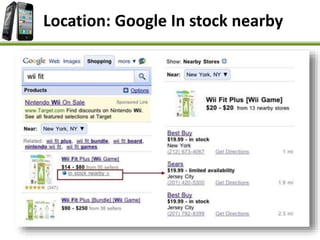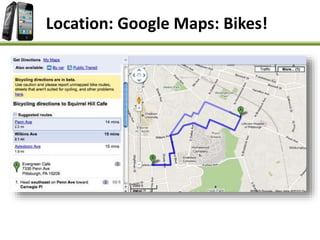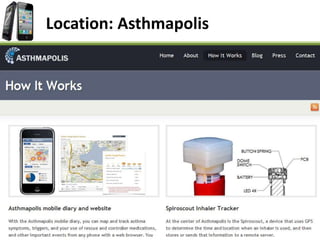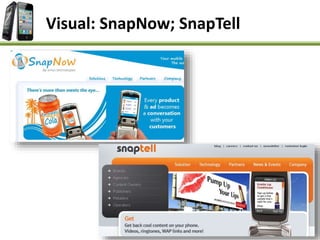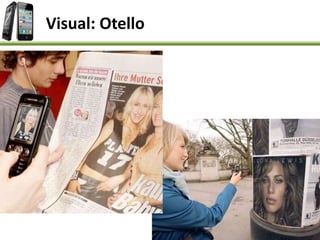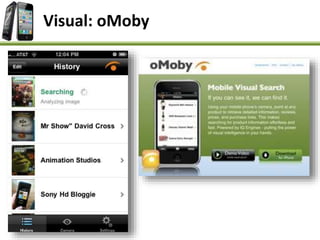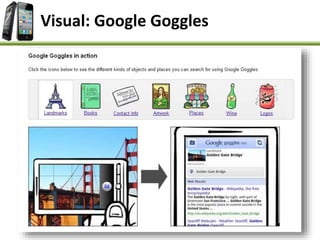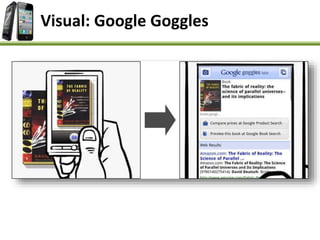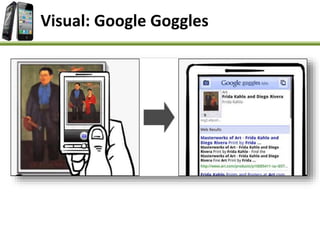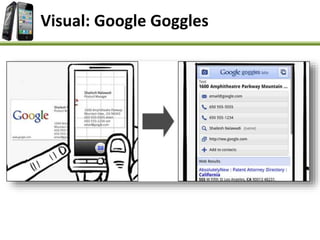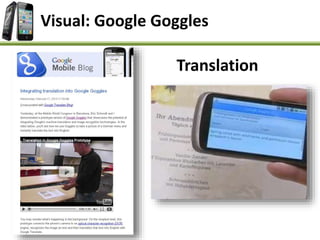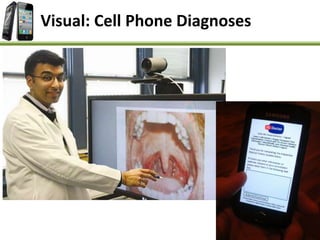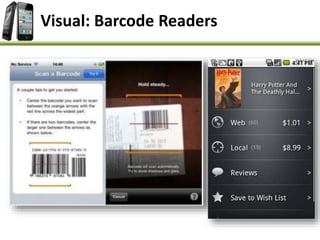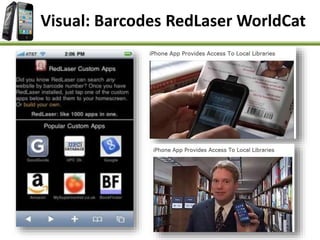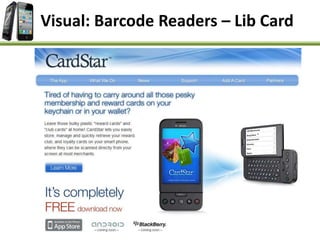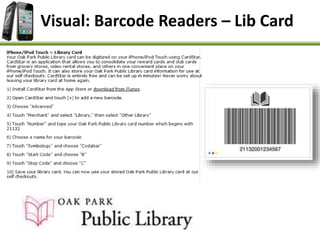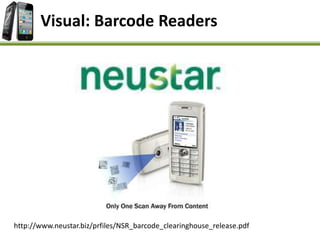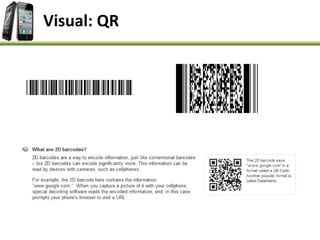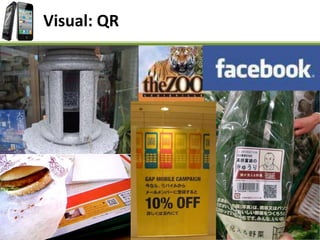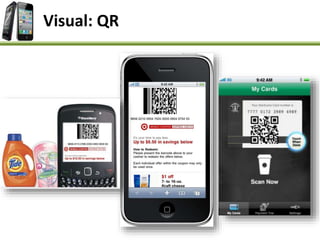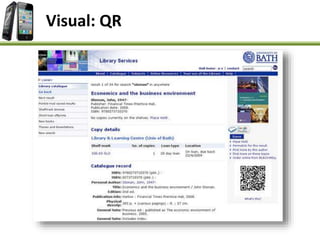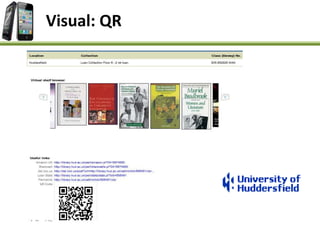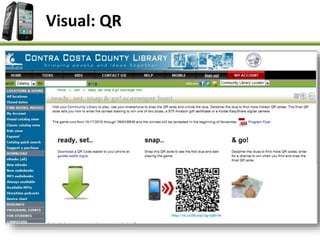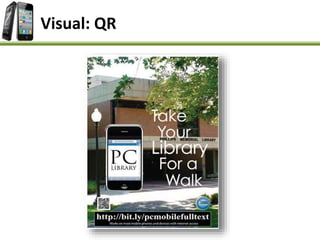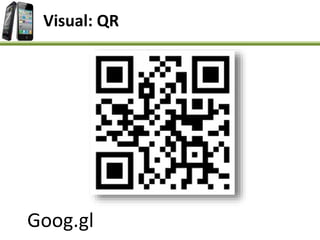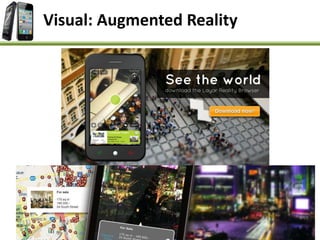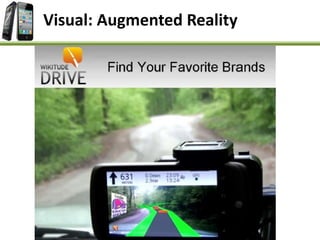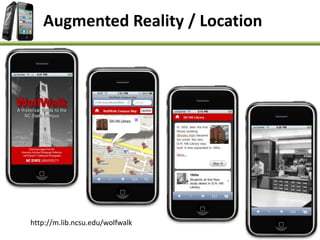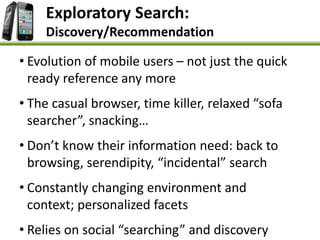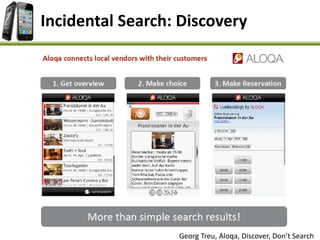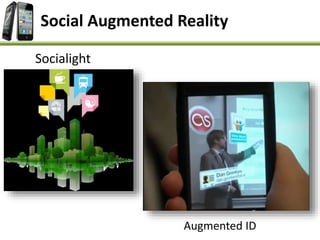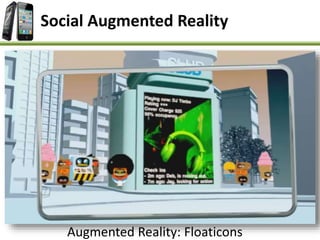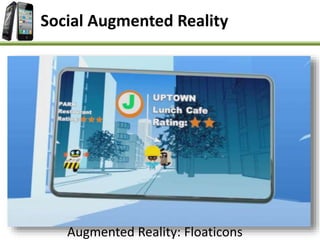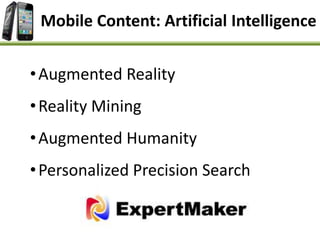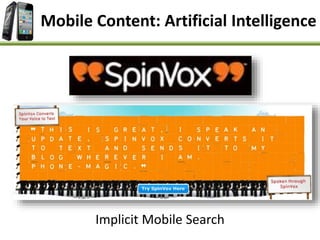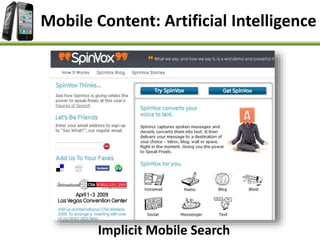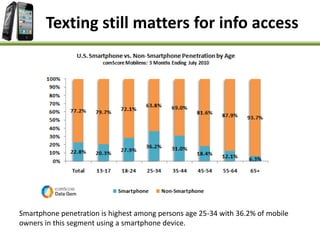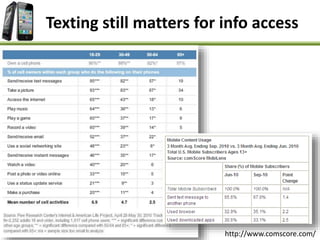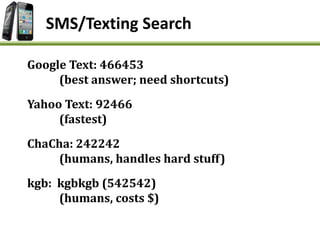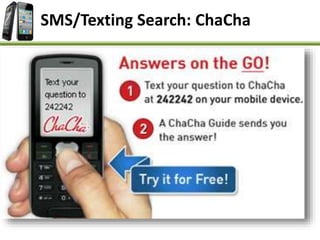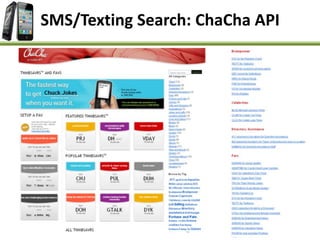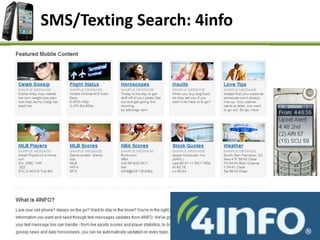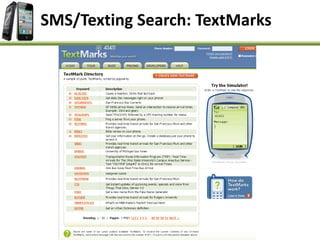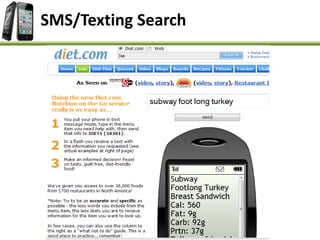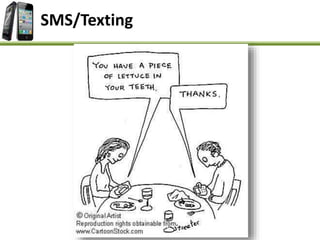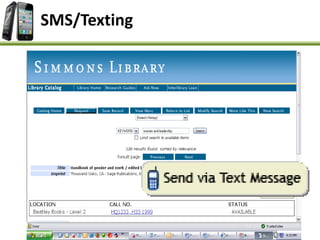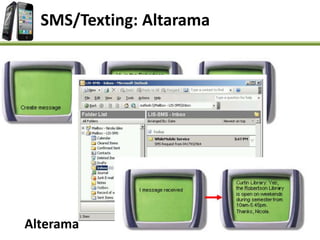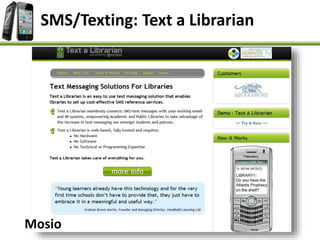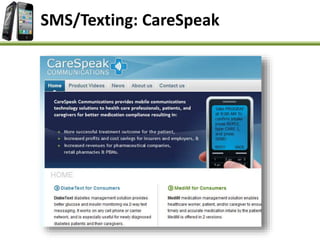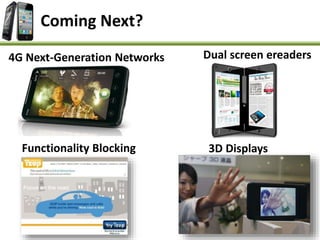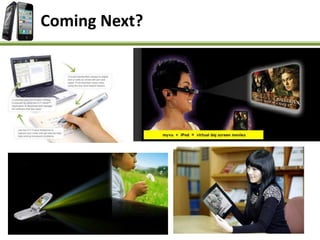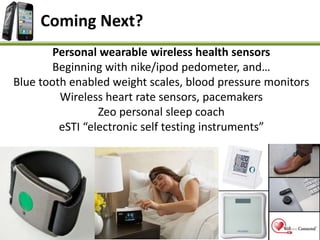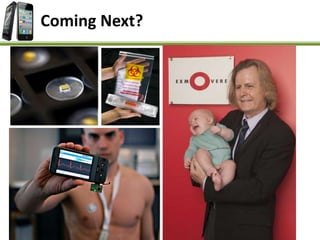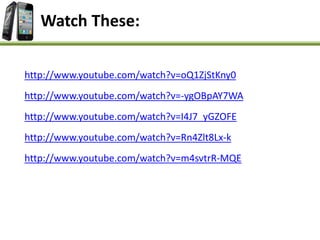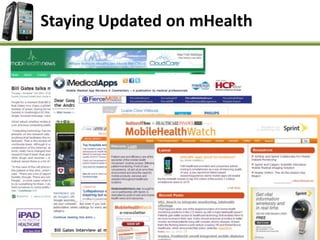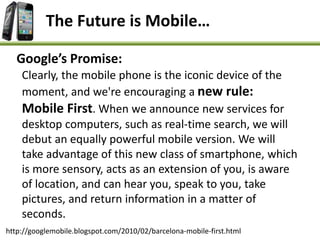Fox mobile scmla_nov_2010
- 1. Getting It On the Go: Mobile Access to Information 2010 SC/MLA Meeting Megan K Fox mfox@jff.org
- 2. Agenda 1. The Mobile Health Market (mHealth) 2. The Mobile Web 3. “Apps” 4. Mobile Libraries (Sites, Catalogs, Resources) 5. Discovering Mobile Information (“Search”) 6. SMS/Texting 7. What’s Next?
- 3. Mobile Access to Information In 2009, for the first time ever, mobile phones were used more for accessing data than to make calls Global Mobile Data Market Update 2009, Chetan Sharma released 4/1/2010 By 2013, mobile phones will overtake PCs as the most common Web access device worldwide Gartner Highlights Key Predictions for IT Organizations and Users in 2010 and Beyond January 13, 2010
- 4. http://www.morganstanley.com/institutional/techresearch/pdfs/Internet_Trends_041210.pdf Mobile Access to Information
- 5. http://www.morganstanley.com/institutional/techresearch/pdfs/Internet_Trends_041210.pdf Mobile Access to Information
- 6. mHealth Summit Nov 2010 World Health Organization defines mHealth as “an area of electronic health “eHealth” that is “the provision of health services and information via mobile technologies such as mobile phones and Personal Digital Assistants”
- 7. Mobile Health 2010 (Pew); Susannah Fox; Oct 19, 2010 Activity Percent Use Own mobile phone 85% Have internet (data) on mobile phone 40% Mobile is only internet access 20% Have looked up health info on mobile via internet 17% Have downloaded mobile health app 9% Sent/received a text 70% Looked up health info from their PC 57% mHealth
- 8. Mobile Health 2010 (Pew); Susannah Fox; Oct 19, 2010 mHealth
- 9. 72% to 94% of physicians use smartphones for personal and professional use, including at the point of care. Spyglass Consulting Group July 2010 study 94% Taking the Pulse April 2010 survey 72% http://www.ama-assn.org/amednews/2010/08/23/bil10823.htm mHealth
- 10. Your platform drives your mobile information access • iPhone/Apple • Android/Google • Blackberry/RIM • Windows Mobile/Microsoft • Nokia • Samsung • Palm • Many more worldwide…
- 11. http://www.comscore.com/Press_Events/Press_Releases/2010/11/comScore_Reports_September_2010_U.S._Mobile_Subscriber_Market_Share Total U.S. Smartphone Subscribers Ages 13+ Share (%) of Smartphone Subscribers Jun-10 Sep-10 Point Change Total Smartphone Subscribers 100.0% 100.0% N/A RIM 40.1% 37.3% -2.8 Apple 24.3% 24.3% 0.0 Google 14.9% 21.4% 6.5 Microsoft 12.8% 10.0% -2.8 Palm 4.7% 4.2% -0.5 Leading Mobile Platforms
- 14. Mobile Web
- 18. • What is MOST necessary for MOBILE users? Mobile Web Content
- 19. App Mobile Web (Browser) vs Apps Mobile
- 20. Mobile Web (Browser) vs Apps
- 21. Mobile Web or Apps? Pros/Cons Mobile Web Apps Device independent, build one Device specific, build many More common coding More specialized coding Push your own updates Relies on “app store” release HTML 5 increases functionality Much greater functionality, re use of camera, GPS, etc Clunkier Slicker and more user friendly Harder to get users, less used (.5% to 6% of library web traffic through mobile) Much more use (build in marketing and distribution channel) Measure use w/google analytics Must build measurement into code
- 22. Gone Mobile? (Mobile Libraries Survey 2010) Lisa Carlucci Thomas Oct 15, 2010 Mobile Libraries
- 23. M-Libraries in libsuccess Mobile Libraries
- 24. http://musingsaboutlibrarianship.blogspot.com/2010/09/library-mobile-apps-vs-web- apps-some.html#disqus_thread Libraries: Mobile Web or Apps? App Mobile Web Total Academic Library 10 60 70 Public Library 15 20 35 Total 25 (24%) 80 (76%) 105
- 27. Library Mobile Web: Boopsie Sites http://musingsaboutlibrarianship.blogspot.com/
- 28. Building Your Own Mobile Site Tons of programming resources: • Just make it ADA compliant ; ) (really simple text) • Outsource to someone like Boopsie, Skweezer, Wink • .mobi guides • Drupal mobile module • Hidden Peanuts MSG (mobile site generator) • Widgetbox Mobile
- 30. mHealth Content: Apple Apps
- 31. mHealth Content: Android Apps
- 32. mHealth Content: Blackberry Apps
- 35. Library Apps
- 37. Building Your Own App
- 38. Building Your Own App
- 39. Library Catalogs
- 40. Library Catalogs: Mobilecat (for III) http://code.google.com/p/mobilecat/
- 41. Library Catalogs: Library Anywhere
- 42. Library Catalog: Search Apps WebSearch Speedy Search
- 44. • American Institute of Physics iResearch iPhone application • The American Institute of Physics' Journal of Renewable and Sustainable Energy (JRSE) • arXiview arXiv for the iPhone • arXiv Browse arXiv for mobile devices • Encyclopaedia Britannica • Factiva news database • Hoover's Mobile company information • IEEE XPlore • Lexis/Nexis Get Cases and Shepardize • PsychiatryOnline • PubMed for Handhelds medical database – PubMed On Tap 3rd party, not official from NIH – Mobile Abstracts an iPhone PubMed search engine, not official from NIH • Scopus for the iPhone • SciVerse ScienceDirect • Social Sciences Research Network iSSRN • Summon (Serials Solutions Web-Scale Discovery) • Zotero • Westlaw legal research database Library Vendors/Publishers http://www.libsuccess.org/index.php?title=M-Libraries
- 53. mHealth Content: Ready Reference
- 54. mHealth App: Pill Phone
- 56. mHealth App: Nettler’s Atlas
- 58. mHealth App: Bedbugs ‘n Things
- 60. mHealth App: MedPage Today
- 61. mHealth App: Drug Trials
- 62. mHealth App: CPR
- 66. mHealth App: iTriage New on android…
- 67. mHealth App: Patient Keeper New on android…
- 69. mHealth App: T2 Mood Tracker
- 70. Major Mobile Web Search Providers Searching and Finding Content
- 75. Searching and Finding Content • Text/Typing (Web browser/App) • Audio/Voice • Gesture (Touchscreen/Accelerometer) • Location (GPS) • Visual (Camera/Barcodes/QRcodes) • Augmented Reality
- 76. Audio
- 77. Audio
- 78. Audio
- 79. Audio
- 82. Audio: Dragon Medical Mobile Search
- 88. Gesture: OCLS Shake It!
- 89. Gesture: OCLS Shake It!
- 91. Location: Next Train Home App
- 92. Location: Public Library Finder App
- 93. Location: Enhances Google Suggestions
- 94. Location: Google Near Me Now
- 95. Location: Google In stock nearby
- 96. Location: Google Maps: Bikes!
- 99. Visual: Otello
- 100. Visual: oMoby
- 106. Visual: Cell Phone Diagnoses
- 108. Visual: Barcodes RedLaser WorldCat
- 109. Visual: Barcode Readers – Lib Card
- 110. Visual: Barcode Readers – Lib Card
- 112. Visual: QR
- 113. Visual: QR
- 114. Visual: QR
- 115. Visual: QR
- 116. Visual: QR
- 117. Visual: QR
- 118. Visual: QR
- 119. Goog.gl Visual: QR
- 122. Augmented Reality / Location http://m.lib.ncsu.edu/wolfwalk
- 123. Exploratory Search: Discovery/Recommendation • Evolution of mobile users – not just the quick ready reference any more • The casual browser, time killer, relaxed “sofa searcher”, snacking… • Don’t know their information need: back to browsing, serendipity, “incidental” search • Constantly changing environment and context; personalized facets • Relies on social “searching” and discovery
- 124. Georg Treu, Aloqa, Discover, Don’t Search Incidental Search: Discovery
- 126. Augmented Reality: Floaticons Social Augmented Reality
- 127. Augmented Reality: Floaticons Social Augmented Reality
- 128. Mobile Content: Artificial Intelligence •Augmented Reality •Reality Mining •Augmented Humanity •Personalized Precision Search
- 129. Implicit Mobile Search Mobile Content: Artificial Intelligence
- 130. Implicit Mobile Search Mobile Content: Artificial Intelligence
- 131. Smartphone penetration is highest among persons age 25-34 with 36.2% of mobile owners in this segment using a smartphone device. Texting still matters for info access
- 132. Texting still matters for info access http://www.comscore.com/
- 133. Google Text: 466453 (best answer; need shortcuts) Yahoo Text: 92466 (fastest) ChaCha: 242242 (humans, handles hard stuff) kgb: kgbkgb (542542) (humans, costs $) SMS/Texting Search
- 135. SMS/Texting Search: ChaCha API
- 138. SMS/Texting Search
- 139. SMS/Texting
- 140. SMS/Texting
- 142. SMS/Texting: Text a Librarian Mosio
- 143. SMS/Texting: LibAnswers Springshare’s LibAnswers Via SMS: TXT your question to (646) 783-1662
- 145. 4G Next-Generation Networks 3D Displays Coming Next? Functionality Blocking Dual screen ereaders
- 146. Coming Next?
- 147. Coming Next? Personal wearable wireless health sensors Beginning with nike/ipod pedometer, and… Blue tooth enabled weight scales, blood pressure monitors Wireless heart rate sensors, pacemakers Zeo personal sleep coach eSTI “electronic self testing instruments”
- 148. Coming Next?
- 150. Staying Updated on mHealth
- 151. Clearly, the mobile phone is the iconic device of the moment, and we're encouraging a new rule: Mobile First. When we announce new services for desktop computers, such as real-time search, we will debut an equally powerful mobile version. We will take advantage of this new class of smartphone, which is more sensory, acts as an extension of you, is aware of location, and can hear you, speak to you, take pictures, and return information in a matter of seconds. http://googlemobile.blogspot.com/2010/02/barcelona-mobile-first.html The Future is Mobile… Google’s Promise:
